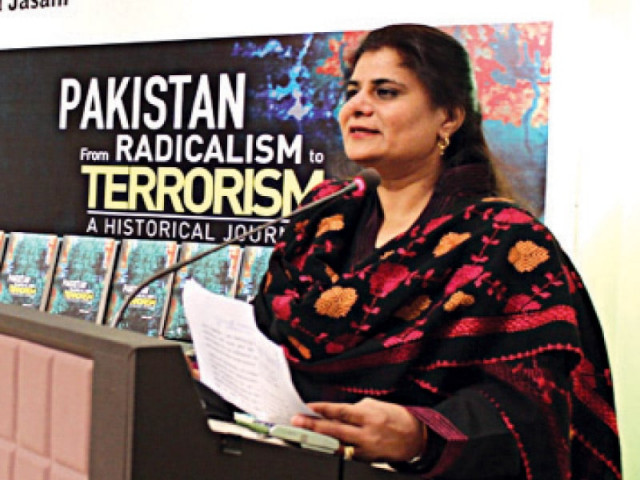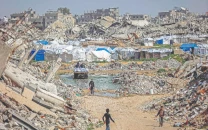Book launch: How did we get here?
Author says it is imperative to critically analyse reasons for Pakistan ‘lagging behind’.

Book launch: How did we get here?
Speaking at the launching ceremony of her book — Pakistan from radicalism to terrorism, a historical journey — at the Heinrich Böll Stiftung office on Tuesday evening, Jasam said Pakistan was blemished with radicalism, extremism and terrorism with religiously inclined ideological underpinnings.

“It is imperative to deconstruct the Pakistani state and society’s journey from radicalism to terrorism,” she states, adding that “it is equally imperative to critically analyse how, where and why it all went wrong.”
In his speech, journalist and author Imtiaz Gul said the subject as well as the story was all too familiar as Pakistan’s genesis in Islam was the driving force for its creation fore-programmed its descent into religious radicalism and eventually itself becoming a victim of its own policies.
Discussing the fatalities of terrorism, he revealed that around 12,280 people have lost their lives and around 31,839 other have been injured in incidents of terrorism since 2007. He added that 16,916 cases were registered against suspected terrorists while only 1,852 were punished.
“There is a drastic need to reform the legal justice system. We need to inject the fear of law in the minds of people, especially the mighty ones.”

Carrying the discussion forward, human rights activist Dr Farzana Bari said though the subject was familiar the author has made efforts to connect the dots from post-colonial stages till today. “She (author) has raised pertinent questions and aptly responded to many of them,” she said. For Bari, the real challenge was how we make a state where we go for reversal in policies.
Meanwhile, anthropologist and documentary filmmaker Samar Minallah Khan was of the view that radicalism has negatively impacted the positive culture of Pashtuns who were more egalitarian in their approach.
She said in a country where a governor was gunned down for talking about procedural changes in laws for minorities, a Christian couple was burnt alive for alleged blasphemy and where a lawyer was killed for pleading an Ahmadi’s case; there was no particular time for raising a voice against the atrocities. “We can’t be selective or divided when it comes to human rights’ violation.”
The author’s note revealed that the book has covered political parties and periods that fuelled radicalisation in Pakistan as well as dwelled on exploring various definitions of terrorism in order to analyse the Tehreek-e-Taliban Pakistan — the most lethal and dangerous umbrella organisation of militant groups in Pakistan.
Jasam, however, said the book was ‘just half truth or a part of truth’ as of course there were other narratives. She added that the book was written with a social-science perspective.
Published in The Express Tribune, December 4th, 2014.



















COMMENTS
Comments are moderated and generally will be posted if they are on-topic and not abusive.
For more information, please see our Comments FAQ